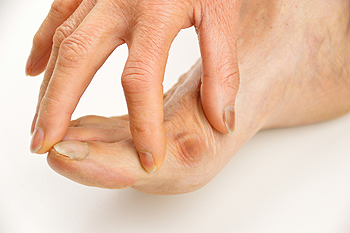1648 US Highway 130
North Brunswick, NJ 08902
 Bunions that develop in young children are referred to as juvenile hallux valgus. They may exist as a result of genetic traits, or from wearing shoes that do not have adequate room for the toes to move freely in. Noticeable signs that your child may have a bunion can include a bony protrusion that forms on the side of the big toe, and red and swollen appearance. A proper diagnosis can consist of having an X-ray taken, as this may help to determine how severe the bunion is. When the bunion is identified at an early stage, it may be effective to use non-surgical techniques to obtain mild relief. These can include wearing shoes that have a wide toe area, or using custom-made insoles that may help to alleviate pressure. If your child has a bunion, it is strongly suggested that you seek the counsel of a podiatrist who can properly treat this condition.
Bunions that develop in young children are referred to as juvenile hallux valgus. They may exist as a result of genetic traits, or from wearing shoes that do not have adequate room for the toes to move freely in. Noticeable signs that your child may have a bunion can include a bony protrusion that forms on the side of the big toe, and red and swollen appearance. A proper diagnosis can consist of having an X-ray taken, as this may help to determine how severe the bunion is. When the bunion is identified at an early stage, it may be effective to use non-surgical techniques to obtain mild relief. These can include wearing shoes that have a wide toe area, or using custom-made insoles that may help to alleviate pressure. If your child has a bunion, it is strongly suggested that you seek the counsel of a podiatrist who can properly treat this condition.
If you are suffering from bunion pain, contact Dr. Robert Fink of Brunswick Foot & Ankle Group. Our doctor can provide the care you need to keep you pain-free and on your feet.
What Is a Bunion?
Bunions are painful bony bumps that usually develop on the inside of the foot at the joint of the big toe. As the deformity increases over time, it may become painful to walk and wear shoes. Women are more likely to exacerbate existing bunions since they often wear tight, narrow shoes that shift their toes together. Bunion pain can be relieved by wearing wider shoes with enough room for the toes.
Causes
Symptoms
In order to diagnose your bunion, your podiatrist may ask about your medical history, symptoms, and general health. Your doctor might also order an x-ray to take a closer look at your feet. Nonsurgical treatment options include orthotics, padding, icing, changes in footwear, and medication. If nonsurgical treatments don’t alleviate your bunion pain, surgery may be necessary.
If you have any questions, please feel free to contact our office located in North Brunswick, NJ . We offer the newest diagnostic and treatment technologies for all your foot care needs.